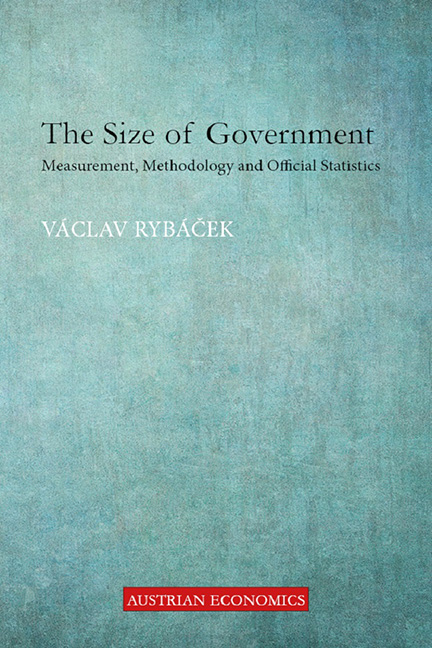Book contents
- Frontmatter
- Contents
- Introduction
- Chapter 1 The Size of Government in Economics
- Chapter 2 The Role of Measuring Government in Economic Policy
- Chapter 3 A Short Trip to the Past
- Chapter 4 The Current Approach
- Chapter 5 What’s Wrong with the Current Approach?
- Chapter 6 The Size of Government and GDP
- Chapter 7 Is the Size of Government Underestimated?
- Chapter 8 Recalculation of the Size of Government
- Conclusion
- Notes
- Bibliography
- Index
Chapter 4 - The Current Approach
Published online by Cambridge University Press: 09 August 2023
- Frontmatter
- Contents
- Introduction
- Chapter 1 The Size of Government in Economics
- Chapter 2 The Role of Measuring Government in Economic Policy
- Chapter 3 A Short Trip to the Past
- Chapter 4 The Current Approach
- Chapter 5 What’s Wrong with the Current Approach?
- Chapter 6 The Size of Government and GDP
- Chapter 7 Is the Size of Government Underestimated?
- Chapter 8 Recalculation of the Size of Government
- Conclusion
- Notes
- Bibliography
- Index
Summary
We have finally arrived at a key point: the way government is currently portrayed in official statistics. Although our main concern is the delimitation of this particular sector in terms of institutions, we shall also address the issue of definition of individual aggregates such as total government revenues and expenditure, or even the definition of debt. Furthermore, to get a full picture, we shall also discuss some key techniques on how the compilation is based. These issues concern the consolidation practice and the choice between accrual or cash principle.
Concerning the last issue – the accounting principle – a brief comment is worth making. In general, all flows in national accounts should be recognized at the time the economic value is created, transformed, exchanged, transferred or extinguished (SNA 2.78); in other words, the accrual accounting principle shall be applied. This implies that the method of financial settlement does not matter. It sounds logical, but we should be cautious when interpreting macroeconomic aggregates that are compiled on this basis.
Consider a sharp growth in GDP; the economy is doing well optically, politicians are trying to take a credit for this, but it turns out that increasing insolvency is spreading over the economy. Technically, cash transactions might lag behind the trend in production (when customers pay late). If so, we can end up in a situation in which there might be widespread business bankruptcies, in contrast to the impression gained from statistical indicators.
Put differently, macroaggregates like GDP, GNI or government balance gives us absolutely no idea how their creation was financed. In these circumstances, it is quite easy for any government to inflate the growth by additional expenditure, not exceptionally financed by an excessive issuance of new government bonds. The construction of national accounts might be tricky for users in some cases, but to be aware of many peculiarities is decisive for understanding its explanatory power.
TAXES
Let’s start with taxes, i.e. compulsory payments paid to government for no direct consideration. Taxes constitute the predominant way of financing government activities. It mostly accounts for about 90 per cent of general government sector revenue; from the macroeconomic perspective, the share of compulsory payments in the EU accounted for nearly 40 per cent of GDP.
- Type
- Chapter
- Information
- The Size of GovernmentMeasurement, Methodology and Official Statistics, pp. 59 - 84Publisher: Agenda PublishingPrint publication year: 2019

